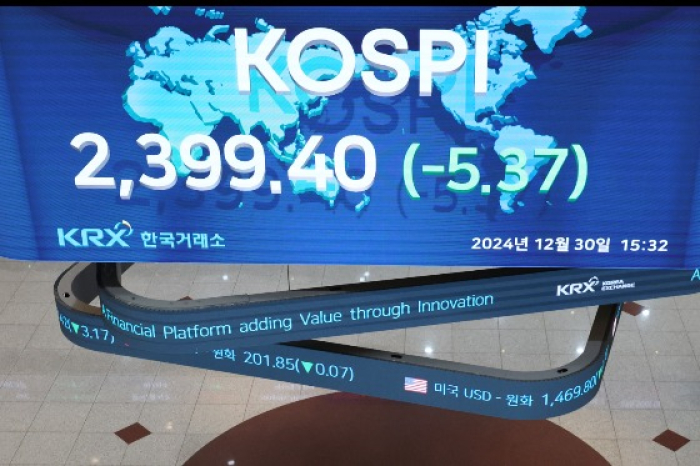
South Korean stocks are expected to bounce back in the new year as their extremely low valuation following investors’ massive sell-offs in 2024 would make their prices very attractive, according to a survey of local securities firms on Tuesday.
Korean brokerages see the current level of around 2,400 will be the rock bottom of the country’s main benchmark Kospi index in 2025.
SK Securities Co. expected the Kospi will bottom out after hitting 2,416 in the new year, while Kiwoom Securities Corp. and Daishin Securities Co. saw 2,400 and 2,380 as the lowest level, respectively.
Samsung Securities Co. and Mirae Asset Securities Co. projected the Kospi’s bottom for 2025 would be 2,350.
Considering that the Kospi ended at 2,399.29 on Monday, the last trading day of 2024, Korean securities firms expected a recovery in the Kospi from the current level in the new year.
“Investors’ general consensus is that 2,400 is a psychological bottom,” said Kim Yong-gu, a senior analyst at Samsung Securities.
Once investors return to pick up Korean stocks, Kospi-listed stocks are expected to rebound rapidly in 2025, securities firms forecast.
BULLISH UP TO OVER 3,200
SK Securities is the most bullish, projecting a ceiling at 3,206, while Shinhan Securities Co. forecast 3,100.
Kiwoon Securities and Daishin Securities forecast 3,000, while Samsung Securities and Mirae Asset Securities expected 2,850.
Based on their projections, the Kospi has room to jump 20% to 30% in 2025 from 2024.
The rationality behind such a sharp gain is the extremely low valuation of Korean stocks after investors dumped them in 2024 largely due to concerns about individual companies’ earnings, including the country’s stock market bellwether Samsung Electronics Co., and the growth pace of Asia’s fourth-largest economy.
The country’s political crisis triggered by South Korean President Yoon Suk Yeol’s ill-fated bid to impose martial law further weighed on the country’s stocks as it sharply depreciated the Korean currency against the US dollar.
Throughout 2024, the Kospi remained stagnant, already declining for six consecutive months and underperforming most of its global peers.
Once Korean stocks start bouncing back, they, however, are expected to revive foreign and idle funds’ appetite, analysts said.
Foreign investors’ net selling of Korean stocks has moderated from 7.42 trillion won in September to 2.86 trillion won in December after Korean stocks’ valuation plunged.
By Han-Shin Park
phs@hankyung.com
Sookyung Seo edited this article.















